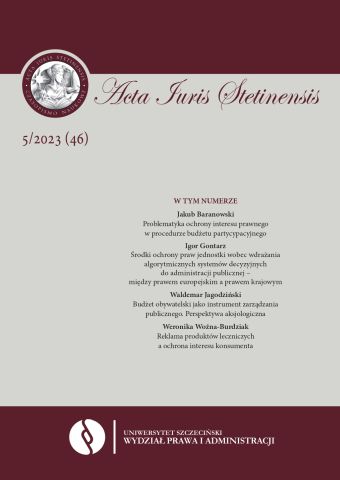






| Authors: |
Jakub
Baranowski

Uniwersytet Szczeciński |
| Keywords: | legal interest protection of legal interest participatory budget social participation local self-government law |
| Page range: | 14 (7-20) |
| Downloads ?: | 79 |
| 1. | Błaszak M., Budżet obywatelski w Polsce i dylematy z nim związane, „Ruch Prawniczy, Ekonomiczny i Socjologiczny” nr 81 (3), s. 203–220. |
| 2. | de Sousa Santos B., Participatory budgeting in Porto Alegre: Toward a redistributive democracy; Stoneham 1998, www.ssc.wisc.edu/~wright/santosweb.html. |
| 3. | Gołaszewski P., Art. 28 Kodeksu postępowania administracyjnego, w: R. Hauser, M. Wierzbowski (red.), Kodeks postępowania administracyjnego. Komentarz, wyd. 8, Warszawa 2023, Legalis. |
| 4. | Leśniewska-Napierała K., Budżet obywatelski jako nowy instrument partycypacji społecznej na obszarach wiejskich w Polsce, „Studia Obszarów Wiejskich” 2019, t. 53, https://rcin.org.pl/Content/86629/PDF/WA51_112338_r2019-t53_SOW-Lesniewska.pdf. |
| 5. | Marchaj R., Charakter prawny uchwały rady gminy w sprawie budżetu obywatelskiego, „Samorząd Terytorialny” 2017, nr 11, LEX. |
| 6. | Marchaj R., Samorządowe konsultacje społeczne, Warszawa 2016. |
| 7. | Mączyński M., Art. 5a ustawy o samorządzie gminnym, w: P. Chmielnicki (red.), Ustawa o samorządzie gminnym, Warszawa 2022. |
| 8. | Misiejko A., Budżet obywatelski w praktyce samorządów, Warszawa 2020. |
| 9. | Piecha J., Art. 18b ustawy o samorządzie gminnym, w: S. Gajewski, A. Jakubowski (red.), Ustawy samorządowe. Komentarz, 2018. |
| 10. | Poniatowicz M., Kontrowersje wokół idei budżetu partycypacyjnego jako instrumentu finansów lokalnych, www.infona.pl/resource/bwmeta1.element.desklight-23986be4-305d-4133-bde1-ea1236670f13/content/partContents/0c6cb150-d33c-365b-a4f6--d7023aecd9ed. |
| 11. | Pośpiech-Kłak A., Art. 101 ustawy o samorządzie gminnym, w: S. Gajewski, A. Jakubowski (red.), Ustawy samorządowe. Komentarz, 2018. |
| 12. | Reszel M., Ograniczenia budżetów obywatelskich w miastach na prawach powiatu w Polsce, https://depot.ceon.pl/bitstream/handle/123456789/21238/4.3.%20M.%20Reszel,% |
| 13. | 20Ograniczenia%20bud%20etów%20obywatelskich%20w%20miastach%20na%20 prawach%20powiatu%20w%20Polsce.pdf?sequence=1. |
| 14. | Sintomer Y., Rocke A., Herzberg C., Participatory budgeting in Europe. Democracy and Public Governance, New York 2016. |
| 15. | Zawadzka-Pąk U., Ochrona dobra wspólnego poprzez budżet partycypacyjny (obywatelski). Studium aksjologiczno-prawne, Białystok 2019. |